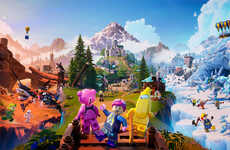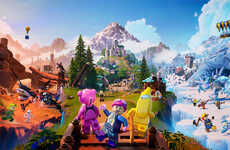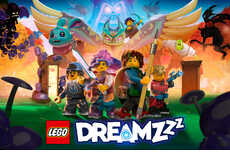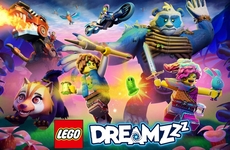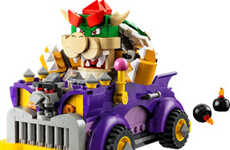
Lego Universe MMOG
References: universe.lego & uk.reuters
It seems kids today are no longer satisfied with any kind of toy if it doesn't have an online component, and that includes Lego.
Did you know kids spend 5 billion hours playing with Lego each year? That number could double, triple or even increase 10 fold with the launch of a new massive multiplayer online game (mmog) called Lego Universe.
Mattel realized the need for an online component and made a virtual Barbie world. Ganz caught on and created the incredibly successful Webkinz. And now Lego wants to jump on board too, announcing they will soon be launching "Lego Universe"
All use the same idea: buy the traditional toy, in Lego's case, the plastic bricks, then register the code it comes with online. That unlocks your key to an online world in which you can play with a virtual version of your real life toy and interact with other kids.
Just like in the Barbie world or Webkinz world, Lego Universe has characters who can buy things, specifically, Lego bricks for building. However, whereas in games like WebKinz the virtual characters have to earn their money through virtual jobs, the Lego characters "earn" their currency through time spent playing.
In other words, the more hours they log playing the game, the more tools they get for building. See an addiction coming on?
"I can't tell everything about the game just yet, but maybe I can give you some hints," says Brian Booker, the game's designer. "Aside from just playing games or trading and socializing, the story allows minifigs to team up—and that's when the real adventuring begins. If the teams of little LEGO people are successful in their endeavors, they'll uncover new zones where they can have new and different experiences:"
"That's all I can say for now, but I'm really excited for the time when I can share more details with everyone!"
As a Lego fan, it does sound pretty cool!
Did you know kids spend 5 billion hours playing with Lego each year? That number could double, triple or even increase 10 fold with the launch of a new massive multiplayer online game (mmog) called Lego Universe.
Mattel realized the need for an online component and made a virtual Barbie world. Ganz caught on and created the incredibly successful Webkinz. And now Lego wants to jump on board too, announcing they will soon be launching "Lego Universe"
All use the same idea: buy the traditional toy, in Lego's case, the plastic bricks, then register the code it comes with online. That unlocks your key to an online world in which you can play with a virtual version of your real life toy and interact with other kids.
Just like in the Barbie world or Webkinz world, Lego Universe has characters who can buy things, specifically, Lego bricks for building. However, whereas in games like WebKinz the virtual characters have to earn their money through virtual jobs, the Lego characters "earn" their currency through time spent playing.
In other words, the more hours they log playing the game, the more tools they get for building. See an addiction coming on?
"I can't tell everything about the game just yet, but maybe I can give you some hints," says Brian Booker, the game's designer. "Aside from just playing games or trading and socializing, the story allows minifigs to team up—and that's when the real adventuring begins. If the teams of little LEGO people are successful in their endeavors, they'll uncover new zones where they can have new and different experiences:"
"That's all I can say for now, but I'm really excited for the time when I can share more details with everyone!"
As a Lego fan, it does sound pretty cool!
Trend Themes
1. Virtual Toy Worlds - Toys that have online components, like Lego Universe and Webkinz, allow for a new type of gameplay and interaction for kids.
2. Online/offline Combination - Toys like Lego Universe and other hybrid toys can create a seamless experience between online and offline play.
3. Earned Currency - Games that use earned currency by time spent playing, like Lego Universe, offer opportunities for innovative monetization strategies.
Industry Implications
1. Toy Industry - Toy companies can innovate by combining online and offline experiences and creating new incentives for gameplay.
2. Video Game Industry - Hybrid toys and games like Lego Universe are creating new types of gameplay and immersive experiences.
3. Online Gaming Industry - By partnering with established toy brands and including physical elements, online gaming companies can enhance the user experience and attract a new audience.
2.1
Score
Popularity
Activity
Freshness

